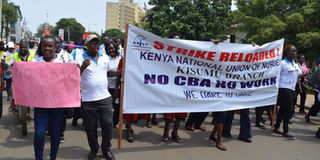Doctors, nurses' strikes to blame for high premature births

Kenya National Union of Nurses members demonstrate in Kisumu on July 5, 2017. The union wants negotiations to be fast-tracked for them to go back to work. PHOTO | ONDARI OGEGA | NATION MEDIA GROUP
What you need to know:
- Mothers are not attending antenatal care clinics to detect major problems during pregnancy.
- According to the World Health Organization, every year, an estimated 15 million babies are born prematurely.
The increase in the number of children born prematurely between January and June has been blamed on doctors and nurses' strikes.
A confidential report compiled by the Ministry of Health also shows that stillbirths have gone up by 15 per cent during the period as a direct result of the strikes.
The report, which is derived from the District Health Information Systems, says the figure of children born prematurely had shot from 6,752 last year to 7,180 this year while that of stillbirths increased from 5,333 last year to 6,120 this year.
HEALTH CARE
Stillbirths, the report shows, are increasing despite a decrease in deliveries.
A premature birth is a birth that takes place more than three weeks before the baby is due.
A stillbirth is a baby born dead after 24 completed weeks of pregnancy. Normally, a pregnancy lasts about 40 weeks.
The deaths, according to the report, were are as a result of the prolonged doctors and nurses’ strikes that have left many women without medical attention during critical hours of delivery.
PREGNANCY
Mothers are not attending antenatal care clinics to detect major problems during pregnancy, the report says.
Other factors according to the report include delay in making decisions at home during an emergency and in accessing health care facilities.
Another factor contributing to the birth of premature babies and stillbirths is delay in receiving health care at the facilities.
“Those who experience the conditions are low-status women who have a poor understanding of complications and risk factors in pregnancy, and of when medical interventions are needed,” the report said.
PUBLIC HOSPITALS
The report also indicated that the number of mothers dying during childbirth doubled to 857 in the first half of this year from 413 deaths registered during a similar period last year.
Dr Walter Otieno, a Kisumu-based paediatrician, said the deaths could be more since the ones recorded were only from hospitals yet more women are giving birth at home.
All public health facilities remain closed as the nationwide nurses’ strike enters its 135th day.
Dr Otieno said premature babies are very delicate and since the nurses are the ones who take care of them in hospitals but they are not at work, more deaths are bound to be reported.
"Immediately a premature baby is born, it needs to be placed in the neonatal intensive care unit, which are not at homes, hence the risk of developing more complications followed by death,” Dr Otieno said.
PREMATURE BIRTH
According to the World Health Organization, every year, an estimated 15 million babies are born prematurely.
Premature birth complications are the leading cause of death among children under five years .
Three out of every four of them could be saved with current, cost-effective interventions.
Figures released by the ministry indicate that of the 1.5 million live births in Kenya annually, 188.000 are of babies born below 37 weeks.
Kenya is among the top 15 countries with the highest rate of premature babies worldwide.
BREASTFEEDING
The report concluded that the country needs to invest in reproductive health services to improve maternal and child care services and the need for the right workforce who are committed, competent and motivated in their work.
Dr Otieno also advised that in case of premature delivery, mothers should practise Kangaroo Mother Care — the practice of the mother carrying the new-born in early, continuous, and prolonged skin-to-skin contact for the much needed warmth and exclusive breastfeeding.
Kenya National Union of Nurses’ deputy secretary-general Maurice Opetu said they are also worried about the situation since nurses handle 99 per cent of the child-bearing process.
“It is the nurses who are involved in the antenatal processes, they are involved in ensuring that mothers are safe and the pregnancy is safe but when they are not in hospital, most of the mothers are not aware of their health conditions,” Mr Opetu said.
RESOLUTION
He said the two governments need to fast-track the negotiations for them to go back to work.
He said since the records of child and mothers dying are high, the two governments need to fast-track the negotiation for them to go back to work.
“We are really eager and willing to go back to work and assist the situation but only after our issues are sorted,” he said.




